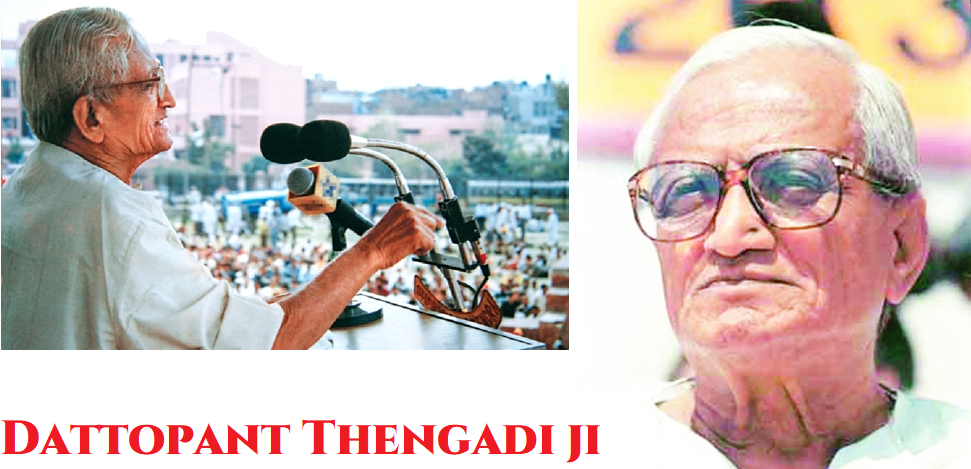Thengadi ji was many things rolled into one: he was an organiser par excellence, a philosopher, and an organization builder. Besides BMS and Kisan Sangh, he was instrumental in the formation of ABVP, SJM, Prajna Pravah, Vigyan Bharati, and many others
At the time when the late Dattopant Thengadi ji set the foundation stone of Bharatiya Mazdoor Sangh, communism was at its pinnacle across the world. Starting a grassroots national labour movement rooted in the pure Bharatiya Darshan and building it brick by brick amidst odds was a lofty task then. It called for conviction, devotion, and persistence on his part. When I try to grasp the frame of mind he would’ve had then, I am reminded of this allegory :
The spring breeze was still a distant memory.Mango flowers had yet to appear on the trees.Just then, a tiny creature stepped out from his warm earthly dwelling.Indifferent to the rouge winter winds shaking his little frame, he began his walk.“Stay put,” his well-wishers tried convincing him, they warned him of the impending dangers.He, however, didn’t heed a single piece of advice.At long last, after an arduous march, he reached the Mango Tree.Taking a brief glance at the tall tree trunk he proceeded onto a steep upward climb.Perched on one of the tree branches, a parakeet was intently watching his moves.Bending his neck, he finally asked, “oh earthly creature, what brings you here, in this cold weather?”“Mango nectar,” pat came a reply.
Laughing hysterically, the parakeet thought to himself, “he sure is the king of fools.” "My bird’s-eye view has inspected each cranny. There isn't a hint of Mango here, Silly,” he smirked.
Steadying his wobbly steps the little creature retorted "You might be seeing what you see, but when I get there the Mango will surely appear."
The response of that creature is like that of a yogi. One who does not wallow in self-pity; who doesn’t fear unfavourable circumstances. Without a trace of even a band of colour on the horizon, he believes the promise of the inevitable dawn. He doesn’t doubt that each step of his walk is consequential and will bear fruits. No matter how much the clever and the wise try to beat sense into him, he remains true to the music of the drummer deep within. His heart resounds the verse “absorb yourself in ‘Hari,’ find Hari in everything that absorbs you.”
It is for all to see, as of today Bharatiya Mazdoor Sangh is the largest labour organisation in Bharat.
No matter how accomplished one is, an able organiser is open to his co-worker’s thoughts and suggestions and promptly accepts the appropriate ones in the interest of the organisation. Thengadi ji was such a gifted organiser. When the decision to take up some organisational activity among workers(trade unions) was made, the nomenclature contemplated was—“Bharatiya Shramik Sangh”. Yet the discussion that ensued among the karyakartas illuminated the fact that the group of the society that this organization will work with will find the word ‘Shramik’ too difficult to comprehend. People of some states might not be able to even pronounce it. Therefore in place of ‘Shramik,’ the colloquial ‘mazdoor’ should be used. This suggestion was duly accepted and the organization came to be known as ‘Bharatiya Mazdoor Sangh.’
Working in an organization entails the journey from ‘me’ to ‘we’. This transition is not easy for any extraordinarily adept person. Usually, such a person is a shadow of his ego. This ego crops up from time to time. Sages, the realised souls have illustrated the irony of the ego when they said, “it is that evil which spares the ignorant and throttles the knowledgeable.” However, safeguarding oneself from such self-criticism is necessary for those who work within, for or with an organization. Thengadi ji had mastered this art. Even in a casual dialogue, while expressing an opinion, offering an insight or a solution he used ‘we’ and not an ‘I’. Elevating one’s sense of self so thin so as to integrate all the people that one is associated with is requisite for an organiser and Thengadi ji was a prolific organiser in this sense.
Another noteworthy quality of Thengadi ji was that he was warm and friendly to all co-workers, their designation and qualification notwithstanding. Placing his hand on their shoulders, he would promenade with even an ordinary worker, making the worker indistinguishable from him. These gestures put the workers seeking his counsel at great ease. Forgetting that they were speaking to a national leader or a renowned thinker of the international stature, they came to see him as their own family elder or a wise community member. While doing so, no artificial efforts were required for Thengadi ji, it used to be effortless and natural.
He was also very well-read person with an in-depth understanding. Oftentimes while in a conversation, he would refer to texts from many books and mention anecdotes of several political leaders. But one trait of his that shines bright in my memory is when a novice karyakarta like me would narrate an anecdote or say a joke that was originally told to us by him, he would listen to it sincerely. Such patience is extraordinary. Many senior karyakartas too are often tempted to dismiss a conversation by saying “I know that.” But Thengadi ji listened to each word intently, as if hearing it for the first time. Not only that, he would go a step further and mindfully reflect upon that remark and unmistakably add a new anecdote or joke thereon. Deep connection with ground-level co-workers is indeed a sign of a great leader.
Despite the temptation, intention and efforts to broaden work undertaken, avoiding needless hurry is also the quality of an excellent organiser. Parampujaniya Shri Guruji would often say "Dheere-Dheere Jaldi Karo" (hasten slowly). One must not be in a haste. A friend of mine was a senior leader in Shri Sharad Joshi’s ‘Shetkari Sanghatana-’ a farmers’ movement in the Vidarbha region. Eventually, he got disillusioned with the movement and came in contact with my younger brother who was also an agriculturist at the time. In view of Kisan Sangh’s recent commencement, my brother deemed connecting this farmers’ leader to the organization appropriate. He introduced that man to me. Thengadi ji was overseeing the operations of the organisation in those days, therefore I approached him with this proposition at Nagpur. Thengadi ji was familiar with this person. I was optimistic that the association of an established leader will aid the momentum of Kisan Sangh’s work and Thengadi ji will welcome him in the organisation. However, no sooner had I finished drawing the backdrop and pinning my suggestion on top he declined it. I was baffled. Later Thengadi ji explained to me that he rejected this leader because Kisan Sangh was a small organization then. He was afraid the organization would not be able to absorb a leader of that man’s stature and he, in turn, would engulf the organization, diluting our efforts. He didn’t want that to happen. To which I said, “if Kisan Sangh doesn’t absorb him then BJP will assimilate him in their party and give him a ticket to contest the elections.” Unphased Thengdi ji calmly responded, “BJP might be in a hurry, we are not.” His lucid and confident response was enlightening and it was then that Shri Guru ji’s words, “hasten slowly” had a new-found meaning for me.
Besides a great organiser, Thengadi ji was also a philosopher. The depths of Bharatiya philosophy would subtly unravel in one’s dialogues with him. The domination of communist thought on the labour movement was such that their thought-process and terminology managed to percolate among almost all labour organisations of that era, becoming apparent in their slogans. At that time he replaced communism-oriented slogans with slogans that were pertinent reflections of Bharatiya Darshan. “Udyogon Ka Rashtriyakaran—Nationalisation of industries” was replaced with “Rashtra Ka Audyogikaran—Udyogon Ka Shramikikaran aur Shramikon ka Rashtriyakaran” means “Industrialisation of the nation—Nationalisation of labours—Labourisation of industries(worker-centric culture in industries)” Inconsiderate and unreasonable slogans that intensified the strife among workers and employers like, “Hamari Mange Puri Ho—Chahe Jo Majboori Ho (fulfil our demands, no matter whatever be the constraints)” were replaced with “Desh ke Liye Karenge Kaam—Kaam ke Lenge Poore Daam (we will work for the nation and will also take the due compensation for the same)”
In the form of these minor changes, awakening the spirit of patriotism.
This transition is not easy for any extraordinarily adept person. Usually, such a person is a shadow of his ego. This ego crops up from time to time. Sages, the realised souls have illustrated the irony of the ego when they said, “it is that evil which spares the ignorant and throttles the knowledgeable”
Besides Bhartiya Mazdoor Sangh and Kisan Sangh, Thengadi ji was instrumental as a key participant in setting a foundation for many other organisations. Akhil Bharatiya Vidyarthi Parishad, Swadeshi Jagran Manch, Prajna Pravah, Vigyan Bharati are a few among those. His essay on Bharatiya Kala Drishti (Indic perspective on performing arts) became the intellectual foundation of Sanskar Bharati.
Walking in the midst of a stalwart thinker, organiser and visionary like Thengadi ji, witnessing the seemingly mundane yet exceptional activities like the manner of his speaking, his style of conducting himself and being blessed with his guidance are moments of bliss and a great honour for me. My humble tribute on the auspicious occasion of his birth centenary.
(The author is Sah Sarkaryavah of Rashtriya Swayamsevaks Sangh) - Organiser






















